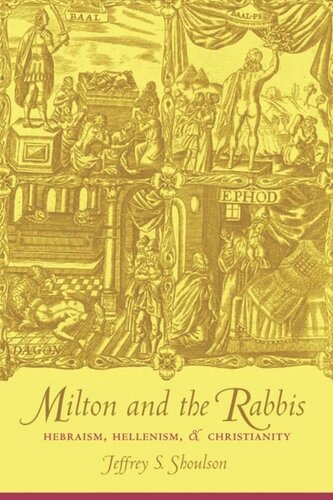

Most ebook files are in PDF format, so you can easily read them using various software such as Foxit Reader or directly on the Google Chrome browser.
Some ebook files are released by publishers in other formats such as .awz, .mobi, .epub, .fb2, etc. You may need to install specific software to read these formats on mobile/PC, such as Calibre.
Please read the tutorial at this link: https://ebookbell.com/faq
We offer FREE conversion to the popular formats you request; however, this may take some time. Therefore, right after payment, please email us, and we will try to provide the service as quickly as possible.
For some exceptional file formats or broken links (if any), please refrain from opening any disputes. Instead, email us first, and we will try to assist within a maximum of 6 hours.
EbookBell Team

4.0
76 reviewsTaking as its starting point the long-standing characterization of Milton as a "Hebraic" writer, Milton and the Rabbis probes the limits of the relationship between the seventeenth-century English poet and polemicist and his Jewish antecedents. Shoulson's analysis moves back and forth between Milton's writings and Jewish writings of the first five centuries of the Common Era, collectively known as midrash. In exploring the historical and literary implications of these connections, Shoulson shows how Milton's text can inform a more nuanced reading of midrash just as midrash can offer new insights into Paradise Lost. Shoulson is unconvinced of a direct link between a specific collection of rabbinic writings and Milton's works.
Taking as its starting point the long-standing characterization of Milton as a "Hebraic" writer, Milton and the Rabbis probes the limits of the relationship between the seventeenth-century English poet and polemicist and his Jewish antecedents. Shoulson's analysis moves back and forth between Milton's writings and Jewish writings of the first five centuries of the Common Era, collectively known as midrash. In exploring the historical and literary implications of these connections, Shoulson shows how Milton's text can inform a more nuanced reading of midrash just as midrash can offer new insights into Paradise Lost.
Shoulson is unconvinced of a direct link between a specific collection of rabbinic writings and Milton's works. He argues that many of Milton's poetic ideas that parallel midrash are likely to have entered Christian discourse not only through early modern Christian Hebraicists but also through Protestant writers and preachers without special knowledge of Hebrew. At the heart of Shoulson's inquiry lies a fundamental question: When is an idea, a theme, or an emphasis distinctively Judaic or Hebraic and when is it Christian? The difficulty in answering such questions reveals and highlights the fluid interaction between ostensibly Jewish, Hellenistic, and Christian modes of thought not only during the early modern period but also early in time when rabbinic Judaism and Christianity began.